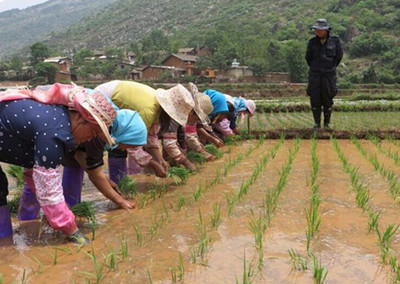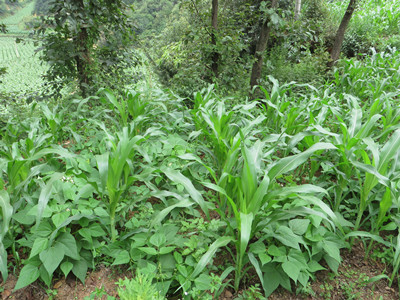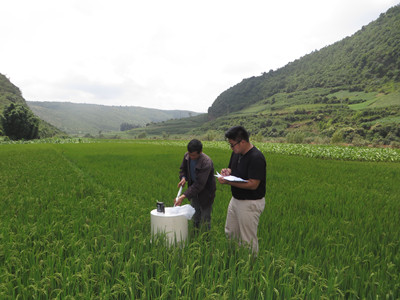Home \ Project News \ From Doubting to Believing – the Path of Climate-Smart Agriculture in Xundian
The concept of Climate-Smart Agriculture (‘CSA’) was put forward by Food and Agriculture Organization (FAO) in 2010, to describe a new triple-win path of realizing food security, climate change adaptation and emission reduction at the same time. CSA has been tried in several countries in Africa and in Southeast Asia and has achieved initial successes.
On Jan. 1st, 2015, HPP – with the funding support of Blue Moon Fund - launched the Climate-Smart Agriculture Project ‘FC Xundian’, a two-year project in Xundian County, Kunming City, Yunnan Province. The project supports 400 households in 2 administrative villages through the forming of‘Farmers’ Clubs’. Aiming at decreasing carbon emissions, strengthening the soil’s carbon storage capacity and adapting to climate change while at the same time improving yields and incomes of farmers, the project advocates climate-smart agriculture methods led by the community with farmer's participation. Since project inception 10 Farmers’ Clubs were established and through them, villagers could organize together to purchase seeds, exchange experiences and share marketing to reduce the cost of their farming production in order to increase its returns. At the same time, the villagers had been trained and learnt various new skills about production planning, budgeting, farming, water and soil conservation, etc. Till the end of 2015, the project held 93 trainings and 10 group discussions and 363 families benefited from the project. The project achieved initial results in emission reduction in yield increase.
As the effects of the project are showing up in the fields, the villagers’ enthusiasm for the cultivation methods is also slowly changing.
At first, many villagers doubted the effect of the new cultivation methods. In 2015, 80 households joined the SRI Subproject, yet half of them didn’t fully understand and believe into the new theory of cultivation and and therefore did not fully plant rice according to the technology, but the SRI result began to emerge as the project progressed, then many of the doubtful households acknowledged the technology and expressed that they would plant rice accordingly. “In the past time, every one Mu of rice planting needed 7 or 8 people to work busily from morning till evening. Now, with SRI technology it takes only half that labour and it can be finished in the afternoon.””At first, they thought I was too young to be better than them, compared to my elders in agricultural production. But now, after they saw the result, they all expressed their will to join the project”, said by Zhang Minhui, who is a young mother and took part in the project since Spring 2015. Now, in the village, she is the agricultural instructor who supports the project farming households.
Since the climate-smart agriculture project was implemented in Xundian by HPP China, it has been well received by the villagers. Many villagers expressed that it helped them a lot. Earlier the villagers used lots of pesticide and fertilizer for the sake of convenience as labor was short in supply. This way costs a lot of money and also destroys the soil and environment. Now, the FC members decreased the usage of pesticide and fertilizer after training and guidance. According to the calculation, the emission reductions amount to 43.49 tons of carbon dioxide equivalent. It truly reached the goal of reducing agricultural inputs yet improving the output at the same time. More important, it improved the farmers’ environmental awareness and combined agricultural production and environmental protection. It also achieved “train one person, prosper the whole household, lead one zone, and enrich the whole area”. Finally the villagers could benefit from the climate-smart agriculture.
Agriculture is not only the sufferer of climate change, but also one of the main producers of greenhouse gasses. It’s not difficult to find the interaction and interplay relationship between agricultural production and climatic change. If we want to duly handle their relationship, the method of climate-smart agriculture provides a good development idea. We have accumulated a lot of valuable related data and practical experience through implementing this climate-smart agriculture project. Though climate-smart agriculture is a new thing in China, its benefits are emerging. We hope that through our efforts, more and more farmers can understand its benefits and join the long march to truly sustainable and climate-smart agriculture. System of rice intensification
System of rice intensification Intercropping of maize
Intercropping of maize Gas sampling
Gas sampling
